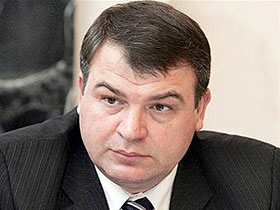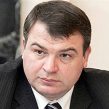
Medvedev Publicly Supports Serdyukov
Publication: Eurasia Daily Monitor Volume: 6 Issue: 53
By:

Since 2000 the Russian defense budget has grown manifold, as did the country’s oil wealth. Last fall a three-year (2009-2011) budget was approved that envisaged hikes in defense spending (see EDM, September 18). Soon after, a radical military reform plan was approved to drastically cut the numbers of officers, army units, and men in order to achieve a regular standing armed force, capable of fighting effectively in local and regional armed conflicts. The old Soviet military that Russia retained after the collapse of the USSR in 1991, required the mass mobilization of millions of poorly trained reservists to go to war with NATO and had shown itself to be ineffective after the end of the Cold War (see EDM, October 16).
But the oil price plummeted as the world economic crisis deepened, and the Russian state budget has gone into the red with revenues predicted to fall more than 30 percent. The Finance Ministry has announced that the three-year budget will be scrapped and Russia will return to one-year budgets. A new emergency budget for 2009 is being put together and may become law by the end of March with spending cuts of at least 15 percent overall. Defense spending will be cut some 8 percent. If the oil price falls further, there may be more budget cuts later in the year (Interfax, March 10; Kommersant, March 18). It is not fully clear how much the defense budget will lose in the end, but the times of massive spending hikes are over.
Still, this week President Dmitry Medvedev was upbeat in addressing a gathering of military chiefs in Moscow. Medvedev announced that budget spending on military pay had increased 10-fold since 2000 and promised that it would continue to grow. The Defense Ministry will buy more flats for officers in 2009. The radical military reform to create a smaller, better-equipped, and capable military will continue "despite financial difficulties." From 2011 new modern weapons would massively rearm the Russian military, said Medvedev. International terrorism and "the expansion of NATO close to our borders," required modernization and rearmament, he stated, "first of all the strategic nuclear forces." Medvedev stressed that "long-term defense plans must be based on a new Strategy of National Security of Russia, which will soon be approved" (www.kremlin.ru, March 17).
In a major speech Minister of Defense Anatoliy Serdyukov echoed the same anti-Western theme about the U.S. seeking world leadership and "together with its NATO allies expanding military presence in regions bordering Russia." Serdyukov boasted that in 2008 Russia had held the largest strategic military exercises since 1986 and defeated Georgia in a brief war last August. Several new Topol-M (SS-27) intercontinental ballistic missiles have been deployed, a new strategic nuclear sub Yuri Dolgoruky is being tested, two Tu-160 (Black Jack) strategic bombers visited Venezuela in 2008, and so on. But the war with Georgia disclosed that Russian soldiers were inadequately trained and equipped with old weapons. Only 10 percent of Russian armaments, according to Serdyukov, could be called "modern" and the number of new weapons procured is too small to compensate for old ones being scrapped. Serdyukov promised that by 2015 up to 30 percent of military weapons would be "modern" and by 2020 up to 70 percent. Serdyukov promised better pay and conditions to the officers who will continue to serve, while those discharged in the course of the reform will receive adequate compensation (www.mil.ru, March 17).
Both Serdyukov and Medvedev seem to have ignored the latest overtures from Washington on better ties and further drastic nuclear disarmament. But this is not a sign of some new Cold War. Their statements were essentially for internal consumption and aimed at the Russian top brass. Serdyukov’s drastic reforms have met with serious opposition within the military. Serdyukov has been accused of modeling his reforms on the Western (primarily U.S.) military (Vremya Novostei, January 15). There were public protests recently about plans to merge the 67th Special Forces brigade based in the small Siberian town of Berdsk with another Special Forces brigade (RIA-Novosti, March 9). The latest reports indicate that the 67th brigade will be disbanded despite the protests (www.lenta.ru, March 18).
Both Serdyukov and Medvedev have sent a strong signal that despite protests and financial difficulties, modernization and westernization of the military will continue and that reform plans have the full support of the top political leadership. At the same time, disgruntled military chiefs were offered incentives: promises of more pay, massive rearmament, and new ICBMs. Anti-American and anti-NATO statements were mostly for internal consumption—to reassure military chiefs and nationalistic officers that the West continued to be the main enemy and that an apparent westernization of the Russian military did not mean a drastic change in the overall foreign and defense policies.
It is not clear whether Russia indeed has the means to reform its military radically, give social protection to discharged officers, aggressively rearm its conventional forces, modernize its strategic nuclear weapons, and confront the West at the same time. Without Western weapon technology, the dilapidated Russian defense industry will struggle to produce all the "modern weapons" the military needs. As normal politicians, Medvedev and Serdyukov promised good things for the future—after 2011, 2015, or 2020—apparently hoping that by then oil prices will rise again. Whether to tackle the West or to seek better relations with it will also be decided in the future, but a much less distant future—after the Medvedev’s forthcoming summit with Barak Obama in London on April 1, April Fools’ Day.




